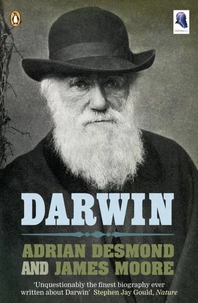In this remarkable book Adrian Desmond and James Moore, world authorities on Darwin, give a completely new explanation of how Darwin came to his famous view of evolution, which traced all life to an ancient common ancestor. Darwin was committed to the abolition of slavery, in part because of his family's deeply held beliefs. It was his 'Sacred Cause' and at its core lay a belief in human racial unity.
Desmond and Moore show how he extended to all life the idea of human brotherhood held by those who fought to abolish slavery, so developing our modern view of evolution. Through massive detective work among unpublished family correspondence, manuscripts and rare works, the authors back up their compelling claim. Leading apologists for slavery in Darwin's day argued that blacks and whites had originated as separate species, with whites superior.
Creationists too believed that 'man' was superior to other species. Darwin abhorred such 'arrogance'; he declared it 'more humble & ... true' to see humans 'created from animals'. Darwin gave all the races - blacks and whites, animals and plants - a common origin and freed them from creationist shackles. Evolution meant emancipation. Darwin's Sacred Cause restores Darwin's humanitarianism, tarnished by atheistic efforts to hijack his reputation and creationist attempts to smear him.
Desmond and Moore argue that only by understanding Darwin's Christian abolitionist inheritance can we shed new light on the perplexing mix of personal drive, public hesitancy and scientific radicalism that led him finally in 1871 to publish The Descent of Man, and Selection in Relation to Sex. The result is an epoch-making study of this eminent Victorian.
In this remarkable book Adrian Desmond and James Moore, world authorities on Darwin, give a completely new explanation of how Darwin came to his famous view of evolution, which traced all life to an ancient common ancestor. Darwin was committed to the abolition of slavery, in part because of his family's deeply held beliefs. It was his 'Sacred Cause' and at its core lay a belief in human racial unity.
Desmond and Moore show how he extended to all life the idea of human brotherhood held by those who fought to abolish slavery, so developing our modern view of evolution. Through massive detective work among unpublished family correspondence, manuscripts and rare works, the authors back up their compelling claim. Leading apologists for slavery in Darwin's day argued that blacks and whites had originated as separate species, with whites superior.
Creationists too believed that 'man' was superior to other species. Darwin abhorred such 'arrogance'; he declared it 'more humble & ... true' to see humans 'created from animals'. Darwin gave all the races - blacks and whites, animals and plants - a common origin and freed them from creationist shackles. Evolution meant emancipation. Darwin's Sacred Cause restores Darwin's humanitarianism, tarnished by atheistic efforts to hijack his reputation and creationist attempts to smear him.
Desmond and Moore argue that only by understanding Darwin's Christian abolitionist inheritance can we shed new light on the perplexing mix of personal drive, public hesitancy and scientific radicalism that led him finally in 1871 to publish The Descent of Man, and Selection in Relation to Sex. The result is an epoch-making study of this eminent Victorian.

 , qui est-ce ?
, qui est-ce ?